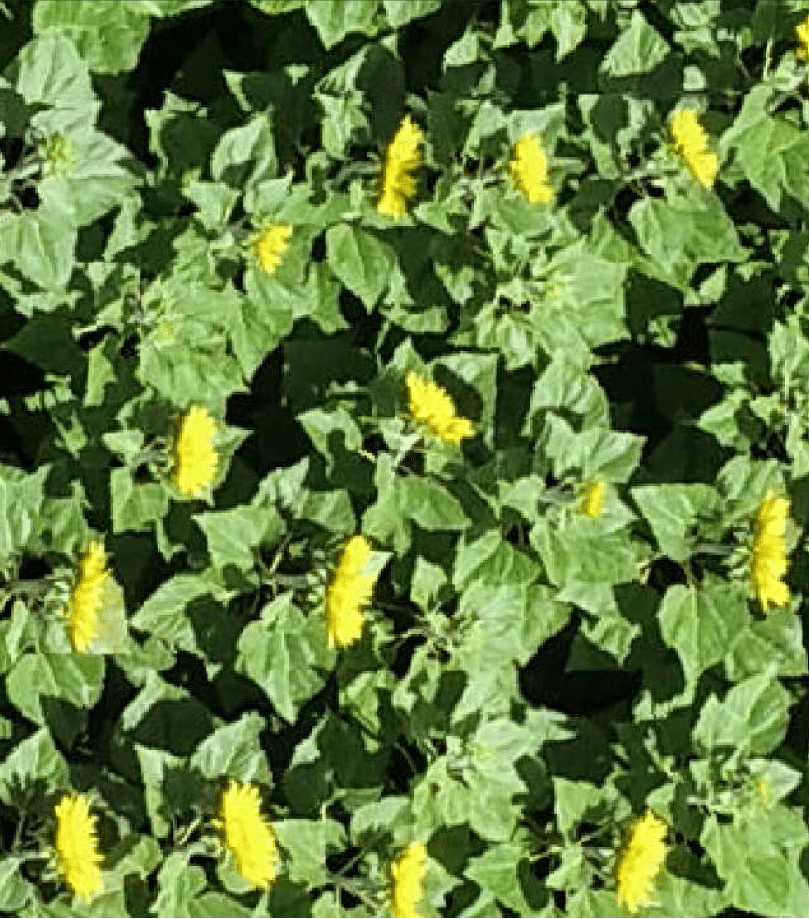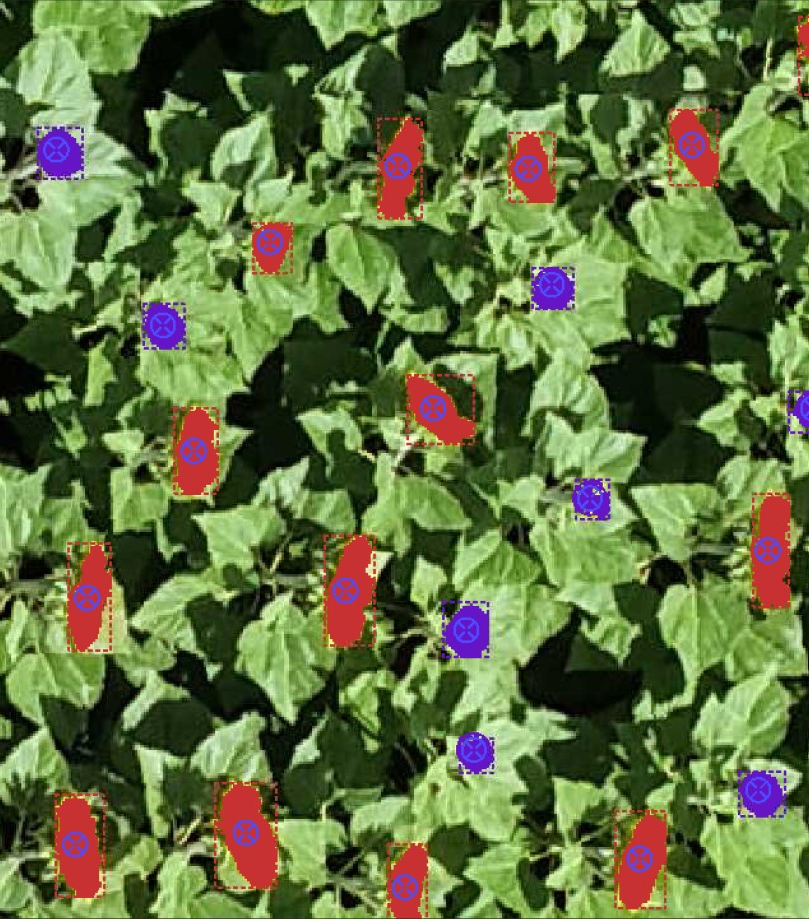Sunflower Flowering Assessment
The image above shows the result of an AI image analysis. Flowering sunflowers (red) are distinguished from still-closed ones (purple).
SUNFLOWERS BLOOM
Efficient with drones and AI
At Pheno-Inspect, we believe the key to advanced plant breeding is the precise observation and analysis of natural development processes. In particular, we see great potential for the digitization of the flowering of sunflowers, a crucial breeding target for efficient varieties, using drones and AI.
Our method combines high-resolution drone technology with advanced image analysis algorithms. By regularly flying over the sunflower fields, our drones identify each plant and distinguish between closed and open sunflower heads. The collected image data is then analyzed on our platform to provide detailed information on the flower’s progress. This method allows us to accurately quantify the number of flowers at different stages, which is crucial for assessing the onset of flowering and predicting seed production.
Our technology provides farmers, breeders, and researchers in agroecology with a powerful tool to accurately detect the onset of flowering in sunflowers. This leads to improved prediction of seed yields and supports the development of robust, high-yielding sunflower varieties. With Pheno-Inspect, farmers and researchers can make data-based decisions that increase the efficiency of breeding programs and contribute to sustainability in agriculture. We are proud to be at the forefront of this technological revolution, leading agriculture into a new era of efficiency and precision.
Digital Plant assessments
Essential as a tool!
Digital assessments play a crucial role in modern agriculture and plant research. They enable precise and efficient assessment of plants and field trials, which are essential for seed and variety development, crop protection, and fertilization strategies. Traditional methods of plant evaluation are often time-consuming and labor-intensive and can only provide limited amounts of data. This is where digitalization offers groundbreaking progress. With technologies such as drones, smartphones and advanced image processing based on artificial intelligence, each plant can be captured and assessed individually. This enables a comprehensive and precise analysis of large field areas and thus significantly improves the quality and informative value of field trials.
The use of digital assessments has several advantages: it increases efficiency by automating data collection, increases the accuracy of the data, and enables a georeferenced and detailed evaluation of test plots. These techniques can be applied to various crops and issues and open up new possibilities in plant research and agriculture. Our web-based solution for the automatic evaluation of exact and strip trials is an example of the power of digital scoring. It offers a user-friendly, integrated platform seamlessly integrated into existing workflows and enables comprehensive analyses across different locations and points in time. With digital scoring, we drive plant research and agriculture innovation to develop more sustainable and efficient cultivation strategies.

Phenotyping
Field Trials & Agricultural Research
In field trials, whether for plant breeding, seed and variety evaluation, plant protection, or fertilization, it is essential to record the phenotypic characteristics of the plants in the field with high precision and reliability. The exact recording of these parameters is the basis for successfully evaluating the trial and the resulting advice. Field trials are typically divided into exact and strip trials. The relevant trial parameters and phenotypic characteristics are recorded using precisely coordinated and timed field and plant sampling. The counting of individual plants, the assessment of weeds, and the professional evaluation of plant diseases are incredibly time-consuming and, therefore, cost-intensive. As a result, even in the “smaller” trial plots in the exact trial, only random samples are often assessed, as there is often no staff available for a comprehensive assessment. This results in an underutilized information potential of the collected parameters. This applies particularly to strip trials, where site and other effects can only be considered to a limited extent. As a result, data collection and evaluation remain below the technical possibilities already available today.
Pheno-Inspect bietet innovative Produkte zur bildbasierten Auswertung der relevanten Parameter. Zuerst werden Bilddaten der Versuche mit einfach zu bedienenden Drohnen oder Smartphones aufgenommen. Danach erfassen die „digitalen Experten“ von Pheno-Inspect, d.h. auf künstlicher Intelligenz basierende Bildverarbeitungsalgorithmen, jede einzelne Pflanze und extrahieren relevante phänotypischen Kenngrößen für das gesamte Prüfglied. Die Bildanalyse ist vollständig georeferenziert. Die Parameter werden direkt unter Berücksichtigung von Parzellen und/oder Teilflächen aus dem Versuchsplan ausgewertet und können bequem über mehrere Standorte und Zeitpunkte statistisch aufbereitet werden. Die Bildverarbeitungstechnologie kann sehr effizient für Versuchszwecke, unabhängig von Kulturart oder Fragestellung und prinzipiell auch für Fragestellungen im gesamten Pflanzenbau verwendet werden.




